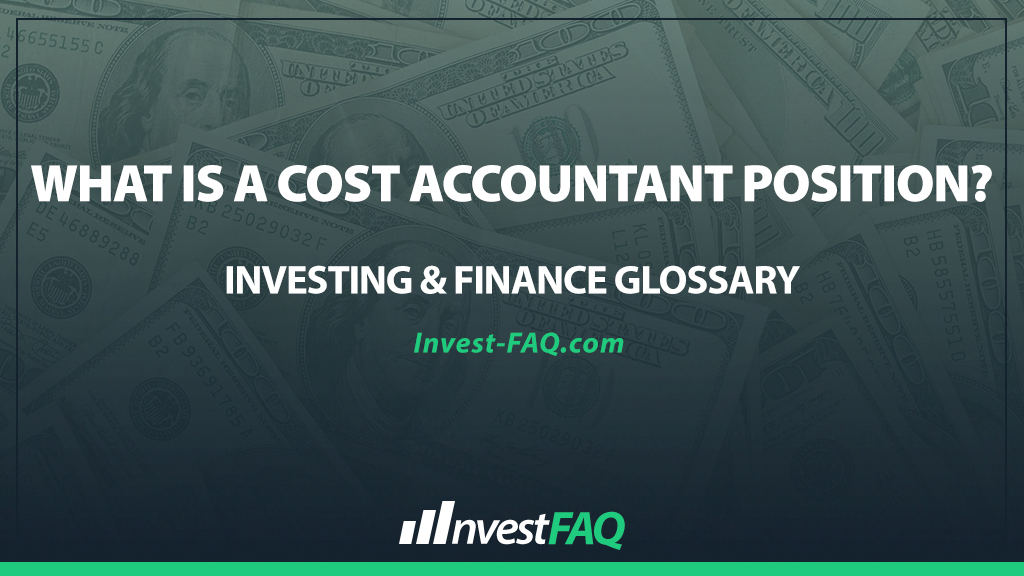
Cost Accountant Position
Contents
A cost accountant position entails a specialized role within a company, dedicated to analyzing, collecting, and reporting on the costs associated with manufacturing goods or providing services. This role is crucial for businesses in managing and reducing costs, improving profitability, and strategic financial planning.
Cost accountants play a vital role in businesses, especially in manufacturing and production sectors, where controlling production costs can significantly impact overall profitability.
They work closely with financial and operational teams to devise strategies that enhance efficiency, reduce waste, and ensure that product pricing is competitive yet profitable. Their insights into cost behavior and cost drivers support budgeting, pricing decisions, and financial forecasting.
Example of a Cost Accountant Position
Consider a manufacturing company, “Widgets Inc.,” that produces electronic gadgets. A cost accountant at Widgets Inc. is tasked with determining the total cost of producing a new gadget.
This includes direct materials ($20 per unit), direct labor ($10 per unit), and allocated overhead costs ($5 per unit). The cost accountant calculates that the total production cost per unit is $35. Based on this information, management decides to set a retail price of $50 per unit to achieve a desired profit margin.
In this example, the cost accountant’s role was to accurately gather and allocate costs to determine the per-unit cost of production.
This process involved not only direct costs, like materials and labor, but also indirect costs, or overheads, which had to be appropriately allocated to each unit produced. By providing a clear picture of the cost structure, the cost accountant enabled the company to make informed decisions about pricing and profitability, highlighting the importance of cost accounting in strategic business operations.
Types and Uses in Business Scenarios
Budgeting and Forecasting: Cost accountants analyze past costs and predict future expenses to aid in the budgeting process.
Cost Reduction and Control: Identifying areas where costs can be reduced without impacting product quality.
Inventory Management: Calculating the cost of inventory, which impacts the valuation of stocks and profit figures.
Pricing Strategies: Helping determine product pricing based on cost analysis to ensure competitiveness and profitability.
The versatility of cost accounting makes it an indispensable function in various industries, particularly those involving complex manufacturing processes or significant service delivery costs.
Significance for Investing & Finance
The significance of a cost accountant position in accounting lies in its focus on the internal control and management of business expenses, distinguishing it from other accounting roles that may focus more on external reporting and compliance.
Cost accountants provide the data needed to support operational decision-making and strategic planning, contributing directly to the financial health and competitive positioning of the company. Their work ensures that businesses not only understand their current cost structures but are also prepared to adjust operations and strategies in response to changing market conditions or internal efficiencies.
In summary, a cost accountant position is essential within companies that require detailed analysis and reporting of production or service costs.
Through their efforts, businesses can achieve better cost control, enhance profitability, and make informed strategic decisions, underscoring the pivotal role of cost accounting in corporate financial management.
FAQ
What qualifications are typically required for a cost accountant position?
A cost accountant position usually requires a bachelor’s degree in accounting or finance, along with a solid understanding of accounting principles, cost management systems, and, ideally, relevant certifications such as CMA (Certified Management Accountant).
How does a cost accountant contribute to a company’s strategic planning?
A cost accountant provides critical data and analysis on production costs, efficiency, and expenditure trends, which are essential for strategic planning, enabling the company to make informed decisions on pricing, budgeting, and cost reduction strategies.
Can a cost accountant help in reducing a company’s operational costs?
Yes, by analyzing detailed cost data and identifying trends, inefficiencies, and areas of waste, a cost accountant can recommend actions and strategies to reduce operational costs without compromising product quality or service delivery.
What industries typically employ cost accountants?
Cost accountants are employed across various industries, especially those involving manufacturing, construction, and services, where controlling and reducing production or service delivery costs are critical to profitability and competitiveness.
